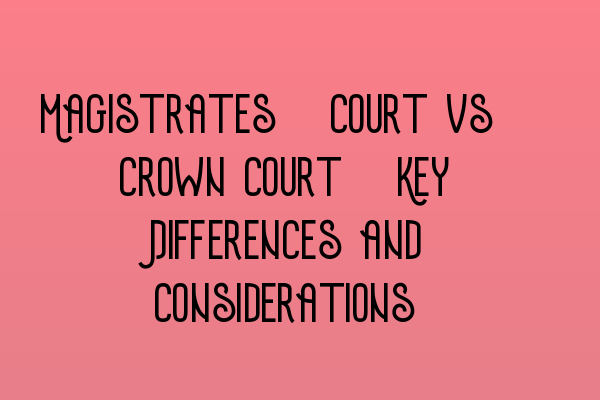MAGISTRATES’ COURT VS. CROWN COURT: KEY DIFFERENCES AND CONSIDERATIONS
Welcome to SQE Criminal Law & Practice UK, where we provide comprehensive guidance on various aspects of the UK legal system. In this blog post, we will explore the key differences and considerations between Magistrates’ Court and Crown Court. Whether you are a law student, aspiring solicitor, or simply interested in learning more about the UK courts, this article will provide you with valuable insights.
1. Introduction to Magistrates’ Court and Crown Court
Magistrates’ Court and Crown Court are the two main types of criminal courts in the UK. Understanding their differences is crucial for both legal professionals and individuals involved in criminal proceedings.
SQE Exam Prep: Essential Study Materials for Aspiring Solicitors
Before we dive into the differences, it’s worth mentioning that the Solicitors Qualifying Examination (SQE) is an essential step in becoming a solicitor in the UK. For those preparing for the SQE, we recommend checking our comprehensive study materials, which cover all the necessary topics.
2. Jurisdiction
One of the key differences between Magistrates’ Court and Crown Court is their jurisdiction. Magistrates’ Court deals with less serious criminal cases, including summary offenses and certain either-way offenses. Crown Court, on the other hand, handles more serious cases, such as indictable offenses and appeals from Magistrates’ Court.
3. Legal Representation
Legal representation is another significant difference between the two courts. In Magistrates’ Court, defendants are usually represented by lay advocates or solicitors, while in Crown Court, representation is primarily carried out by barristers. Barristers are typically instructed by solicitors, adding an additional layer to the legal process.
Expert Testimonies in UK Courts: Building Strong Cases
Building a strong case in the UK courts often involves the use of expert testimonies. If you want to learn more about this topic, we recommend reading our article on expert testimonies in UK courts.
4. Sentencing Powers
Sentencing powers differ significantly between Magistrates’ Court and Crown Court. In Magistrates’ Court, the maximum penalty for most offenses is limited to six months’ imprisonment or a fine. Crown Court, on the other hand, has the authority to impose much more severe penalties, including life imprisonment.
5. Trial Procedure
Another aspect to consider is the trial procedure. In Magistrates’ Court, the trial is conducted by a bench of volunteer lay magistrates or a district judge. The proceedings are generally less formal compared to Crown Court trials. In Crown Court, trials are conducted by a judge and a jury, ensuring a fair and impartial decision-making process.
6. Appeals
If a defendant is dissatisfied with the decision reached in Magistrates’ Court, they have the right to appeal the decision to the Crown Court. On the other hand, decisions made in Crown Court can be appealed to higher courts, such as the Court of Appeal or the Supreme Court.
Demystifying the Solicitors Qualifying Examination Format
For those interested in understanding the format of the Solicitors Qualifying Examination (SQE) in greater detail, our article provides a comprehensive overview.
7. Public Perception
Public perception also plays a role in the choice between Magistrates’ Court and Crown Court. Magistrates’ Court is generally seen as more accessible and less intimidating to individuals involved in criminal cases. Crown Court, due to its higher-stakes nature and formal proceedings, may be perceived as more complex and challenging.
8. Cost Considerations
Cost is an important factor to consider in any legal process. Magistrates’ Court proceedings are usually less costly compared to Crown Court trials. This is mainly due to the differing levels of legal representation and the overall complexity of the cases handled by each court.
9. Conclusion
Understanding the key differences and considerations between Magistrates’ Court and Crown Court is vital for anyone involved in the UK criminal justice system. From jurisdiction and legal representation to sentencing powers and trial procedures, each court brings its unique characteristics to the table.
If you are an aspiring solicitor preparing for the SQE or interested in learning more about the UK legal system, we encourage you to explore our comprehensive study materials and other informative articles on the SQE exam and legal practice.
SQE Exam for International Lawyers: Challenges and Success Strategies
International lawyers facing the SQE exam may encounter unique challenges. Our article discusses these challenges and provides strategies for success.
LLC Formation Made Simple: Step-by-Step Guide for UK Entrepreneurs
For UK entrepreneurs looking to form a Limited Liability Company (LLC), our step-by-step guide simplifies the process and provides valuable insights.
